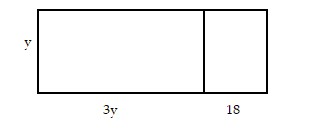Solve the problem.After an injection, the amount of a medication A in the bloodstream decreases with time t, in hours. Suppose that under certain conditions A is given by A(t) =  , where Ao is the initial amount of the medication given. Assume that an initial amount of 25.0 cc is injected. According to this function, does the medication ever completely leave the bloodstream?
, where Ao is the initial amount of the medication given. Assume that an initial amount of 25.0 cc is injected. According to this function, does the medication ever completely leave the bloodstream?
A. Yes
B. No
Answer: B
You might also like to view...
Solve the problem.Write an expression for the area of the larger rectangle below in two different ways.
A. y(3y + 18); 3y2 + 18y B. 2y(6y + 36); 12y2 + 72y C. 18(3y + y); 72y D. 3y(y + 18); 3y2 + 54y
Solve using the substitution method. Use a graphing calculator to check your answer. x + 2y = 167x + 14y = 112
A. (7, 7) B. (0, 0) C. No solution D. Infinitely many solutions
A hospital has a 2%-saline solution and an 8%-saline solution on hand. How much of each should be used to prepare 3,600 cm 3 of 7%-saline solution?Amount of 2%-saline solution: __________ cm 3 Amount of 8%-saline solution: __________ cm 3
What will be an ideal response?
Solve the quadratic equation by any method. x2 + x +
x2 + x +  = 0
= 0
A. -7 ± 
B. -14 + 
C. 7 + 
D. 7 ± 